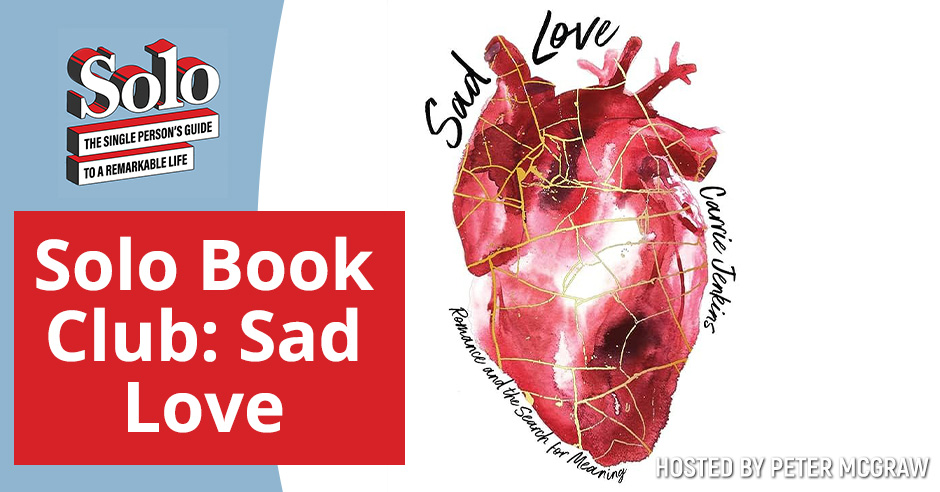Peter McGraw welcomes back Amy Gahran and Laura Grant into the Solo Studio for the third Solo Book Club. They discuss Carrie Jenkin’s book, Sad Love: Romance and the Search for Meaning.
Want to talk about the episode with other listeners? Join the Solo community: https://petermcgraw.org/solo/solo-community-application/
—
Listen to Episode #181 here
Solo Book Club: Sad Love
Amy Gahran, welcome back. Laura Grant, welcome back.
Long time no see.
The third installment of the Solo Book Club. You two have been excellent guests.
Thank you so much.
For many of my most popular entertaining episodes, the last book club episode, we read and dissected Four Thousand Weeks by the Burkeman, as Laura would say, Oliver Burkeman. Previous to that was Minimizing Marriage. This one came as a demand, I would say. Amy demanded the book.
You’re not going to say no to me.
It’s Sad Love by Carrie Jenkins. Let’s jump on in. Amy, make the case for why this book is worthy of the Solo Book Club.
First of all, it is another philosophy book. Keep in mind, I have thought for most of my life that I’m just allergic to philosophy because I’m a very practical person but this book spoke to me on so many levels. It spoke to me as a solo person. It spoke to me as a member of a large family that’s going through a lot of stuff. It spoke to me as somebody who values my networks of friends, chosen family, and community.
It spoke to me in my sexual and romantic relationships as well. Also, in my relationship with myself. This book hit all those buttons for me in ways that almost no other relationship book has hit before. I appreciate that. Also, speaking as a writer and editor, Carrie Jenkins is a kickass writer. I would have taken a different take on the title, Sad Love, but I can see why she did it.
I agree. It’s a worthy book for the book club, and certainly, is provocative and could be useful. Laura, you have been tasked. I gave out assignments. What is this book about? We know it’s important. What are the main arguments?
Let me walk you through a little bit of what’s going on in this book. First of all, we’re going to decompose the dream. What dream is that? It’s the American dream. The American dream is all about the pursuit of happiness. She talks a little bit about what happiness is. It’s positive feelings. It’s very individualistic in our culture and your happiness is under your complete control. Poverty doesn’t matter. Systemic oppression doesn’t matter. Just choose happiness.
She then extends that into the romantic dream. The Disney industrial complex offers us this happily ever after. Love equals happiness. They are the same, except in the rare instance, where love is tragic and madness but we won’t go there. A good life is full of love and happiness. The best things in life, love, and happiness are free and to live a good life, you should be in constant pursuit of these things.
She then goes, “What’s wrong with that?” First of all, she talks a lot about the happiness paradox, and here’s the philosophy alert. She’s dropping a lot of names like Viktor Frankl and John Stuart Mill. They’re all agreeing that happiness cannot be pursued. It must ensue. It means that if you are individualistic clamoring after happiness, that is a great way of failing to be happy. You have to go about it another way to focus on something outside of yourself, something bigger than your own happiness in order to as a side effect, perhaps achieve happiness.
She talks a lot about toxic positivity in our culture and how that blinds us to reality. My favorite philosopher, BoJack Horseman said, “When you look at someone through rose-colored glasses, all the red flags just look like flags.” “All right, Carrie Jenkins. This seems like a bad deal. What alternatives are you posing here?” She’s inviting us to unlearn the American romantic dream. Abandon all of that toxic positivity.
We talked about amatonormativity. She touches on that. Take off those rose-colored glasses, see the reality of yourself, see the reality of the world, and use that in your full range of human emotion to surround yourself with others who share your values and your passions to create meaning. It’s this pursuit of meaning that leads to a new model of love. She calls it eudaimonic love.
Let’s not pretend, we’re always going to be happy. Let’s create meaning. Let’s not only focus on feelings but also on practicing with intention. This dynamic collaborative and intentional way of loving also responds and acknowledges that the context that we live in, the environments we live in, and the other people who we’re in relationships with are all important to co-create this kind of love.
I would give that an A.
I would too. The one thing I would add to that is she keeps coming back to Victor Frankl’s book, Man’s Search for Meaning. Happiness is not the point of love. She argues that the point of love is creating meaning and co-creating meeting with people. Meaning is very important. It gets overlooked in a lot of the dialogue about love and you can have the full range of human emotion associated with finding meaning. That is something I related to here because honestly, most relationships that have involved significant love for me have been all over the place with the emotional spectrum.
As someone who early in his career studied ambivalence, a lot of this resonated. This idea is that you can be happy and sad at the same time. I want to define a few terms to help the reader follow along. There’s this notion of romantic love. This is the love that’s characterized by intense feelings, passion, intimacy, and connection. Often, pair bonding is happening at that time and it’s easy to feel swept away by that. It feels like it’ll last forever, and it doesn’t.
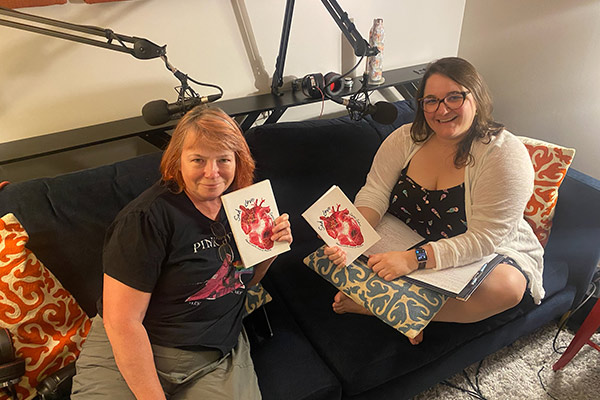
Disney told me it would. I find the love of my life and the story ends with us dying together in each other’s arms.
Disney lied to you.
Also, this eudaimonic love, or eLove as you want to call it. It’s a type of love that’s based on this Greek concept of eudaimonia or human flourishing. Eudaimonic love is not about happiness in this pleasure kind of way, but rather finding meaning and purpose in relationships. The happiness which you started by talking about is this sense of well-being, contentment, pleasure, and positivity.
It didn’t used to be. I love how she dissects the etymology of happiness. That’s a great part of the book to read.
As someone who studies well-being, it’s important to get these terms right. Also, meaning a sense of purpose or significance. All of these things end up mattering because you got to understand the terms in order to understand, which of these pursuits are worthwhile and have these challenges associated with them. One of the things that I wrote down is this notion of the pursuit of happiness. I love the Frankl quote. I’ll say it again, “Happiness cannot be pursued and must ensue.”
That’s counterintuitive to us because we’ve been taught to set a goal and work vigorously to achieve that goal. One of the things I’ve written in my book is the downside of goals. A goal was an agreement with yourself to be unhappy until it’s satisfied. If your goal is to fall in love, if your goal is to be happy, until you can make that happen, you’re feeling less than. As this being pointed out, the task of trying to achieve this ends up erasing much of the happiness. It’s super counterintuitive in terms of lean into these other things and then it becomes a symptom of this outcome.
In that pursuit, eventually, if you do achieve that goal, you’re not taught to savor that. We’re taught to move on to the next goal.
Oftentimes, reaching a goal is not a euphoric experience anyways. Amy, when you finish writing a book, do you feel euphoria?
I was relieved. When I shared the news that I had finished writing my book with my closest people, I got such an outpouring of celebration. I started to feel some of the euphoria because they knew how hard I worked on it for years. Initially, it was just like, “I just wrote the last thing. Yes.” It’s because it was such a draining experience getting through that final slog to finish it.
What about you when you achieve an important goal?
I’m not a goal-oriented person. These are lessons that I’ve carried with me for a while enjoying the process.
How’d you come to that? It’s because it takes a lot either inside or something special to have that happen. I’m only getting to it now.
Seeing in my parents the no-nonsense discipline of constant working, not even in a professional sense, but always striving and working for something. They achieved wonderful things. They came from very little and created a much better life for my brother and me. However, seeing that as a never-ending slog and having the privilege but also choosing not to live that way. Do I still do it to some extent? Of course. I’m part of the late-stage capitalism here in America.
You’re part of the spreadsheet industrial complex.
I’m doing well in it. Clearly, I’m doing something there that fits this model but I tried to stay more process-focused.
Anything else about these main arguments that she makes. I solicited topics that you want to talk about specifically, but I do like this arc of the book. Philosophers are very good at this. They’re very good at laying out arguments and this notion of challenging this path to happiness and then pointing out the difficulties and the painfulness of the human condition. Also, presenting this alternative style of love that is more realistic and can incorporate where the pain is not a bug. It’s a feature.
One thing I like that she did is that she came up with the notion of the romantic mystique similar to Betty Friedan’s The Feminine Mystique, which is the idea that it’s only romantic if you don’t examine it too closely. It’s all about the soft focus that you see in the movies and TV. If you talk about it and negotiate it too much or think about it too clearly, it becomes unromantic and that’s supposed to be a bad thing.
However, the mystique always bugged me because I always felt better about all of my connections with people including my romantic relationships after we started negotiating things and navigating some bumps together. This is resonant with my experience in a way that the romantic mystique always pissed me off.
I had an episode on Relationship Design and I’ve been talking about intimacy design. There are people who don’t like intimacy design. They don’t like the idea that you plan your sexual encounters and that you negotiate and navigate them before flesh on flesh is happening. Their critique of it is it ruins the spontaneity and excitement. I believe it’s the opposite.
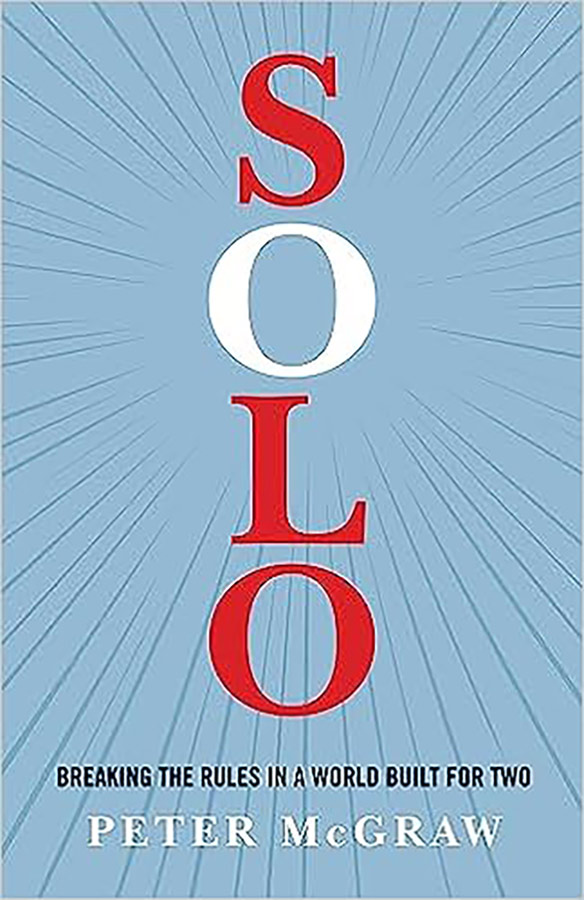
When done, it builds excitement, intimacy, and connection, but you’re right, Amy. When you are able to negotiate a bumpiness with a partner, whether it be romantic or sexual, the next bump is not that threatening versus when you believe you’re in love and love is going to solve all your problems that suddenly that red flag pops up. You’re like, “No.” It can create this crumbling.
That’s a very powerful concept in this book. She doesn’t give it as much space as she gives other concepts in the book, but it’s still a very important one, the romantic mystique.
I’ve never thought of it that way. I’m disinterested in falling in love in the traditional sense.
I’d rather walk into it. Falling just sounds like I’m going to break something.
Even the term falling is interesting. These terms of being swept away. It has this feeling of being out of control.
It’s about the emotional intensity of a particular. Intensity does not equal insight. Intensity often actively interferes with insight and in order to genuinely connect with somebody, you have to get a sense of who they are. All that intensity swirling around might feel good. Heroin feels good too.
I fell in love for an afternoon and it was wonderful.
I thought you were interested.
She was lovely.
I’m happy for you.
It was great. It was an afternoon. I’m being honest about that. I still have a great deal of affection for the person and I would love to see her again but I called a friend and she’s like, “I can hear it in your voice,” and I was like, “I know,” and so it can be done.
It’s a delicious feeling. That’s for sure. There’s a lot to this romantic mystique that’s appealing. When you dismantle the romantic mystique, it helps you see the beauty in the romance of a lot of kinds of relationships.
Let’s step back and talk about happiness a little bit. As this unfolds, let’s try to follow her arc a little bit. Let’s step back and get a little bit more into this pursuit of happiness, this desire, or this part of our cultural fabric. Laura, I know you have some specifics about this.
One thing that comes up in the book a lot is this is all made up. We are making it up and it hasn’t always been this way. One of the things we talk about with happiness is now we think of it as positive feelings, generally feeling good, and it comes from the same root word as happenstance. It had a lot to do with luck and your environment. Also, whether the wind was at your back and everything was working out for you. We’ve morphed it into more of an individualistic concept that something that is under your own control. That’s an interesting change that’s happened over time.
Also, it’s something you deserve.
If you don’t have it, whose fault is that? It’s your own. You’re not meditating enough or you’re not going to the right yoga studio or you’re not eating the Wheaties or whatever and that’s your fault that you’re not achieving this happiness. Something I hadn’t thought about before was how putting the blame on individuals for not being happy blinds us to a lot of negative things in our culture like systemic, oppression, poverty, class disparity, and all these things that are the real barriers to pursuing happiness or even meaning. It’s also like, “Since we’re blaming the individual, we don’t need to examine any of those other factors.”
Our institutions certainly don’t. The Constitution says the pursuit of happiness and yet our institutions aren’t set up to create happiness. I joked. At the University of Chicago, the saying is, “It’s where fun goes to die.” This elite institution is not a joyous place. Our schools aren’t joyous places. Many of our churches aren’t joyous places.
Amy and I were both raised Catholic. These were not joyous places. The evangelical Christians are onto something because they create joyous ceremonies. Even our medical institutions are about removing illness and yet 1 in 4 Americans live in chronic pain. It’s very difficult to live a happy playful life when you are dealing with constant pain, and your medical providers aren’t well-equipped to help you deal with that.
Also, to remove the bad things enough to be able to get to a place where you can experience the good things. Moreover, a lot of our goals in life require us to set aside our happiness. Parenthood is one of those things and any ambition, typically. Writing a book may be engaging. You may have moments of relief but a lot of it is work. You forgo pleasures in order to be able to do those things.
I feel like the message is at best incomplete. We are better off having more positive emotion in our life than less but recognizing that it comes with a trade-off and being comfortable with the trade-off. If you want to pursue a life of meaning, a life of achievement, and a life of engagement, it often necessitates setting aside pleasures or delaying gratification, for example. All of those paths are worthy as long as they’re the paths that you want to walk.
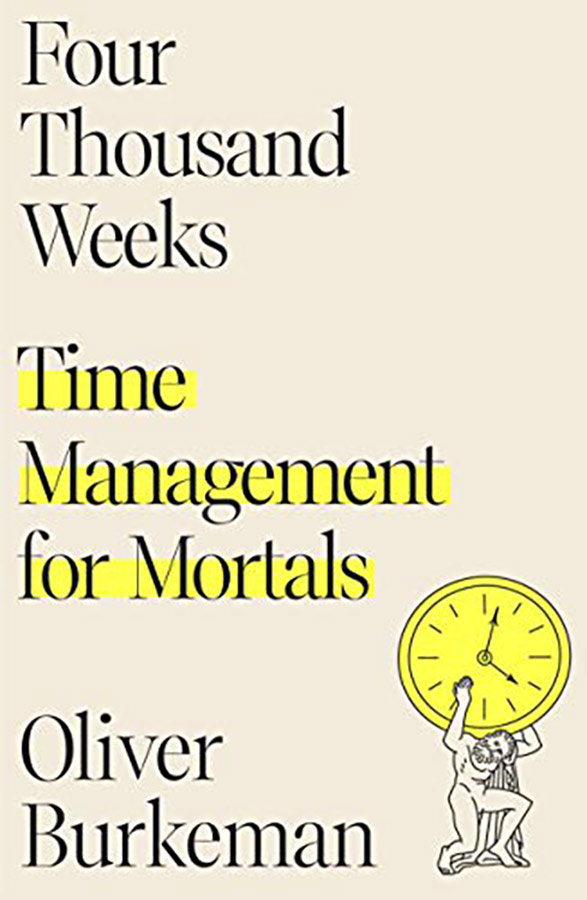
I like how she also talks about how we pathologize sadness or any emotion that we view as unpleasant or negative. She has a quote, “The voice of sadness is censored as sick.” That was from Julie Reshe. In other words, if sadness is sickness, then it is censored out. We’re not hearing those voices anywhere in the media or we’re discouraged from even talking about those things with people close to us and certainly, with people who are less close to us like co-workers, friends, etc. It paints this picture that everyone else is also happy all the time, which further alienates people who are not feeling that way, and all of us feel some kind of sadness at some point. It’s driving us apart from each other.
I do feel that and it’s easy to poop on social media, but one of the things about social media is that people can often be very vulnerable and share their challenges. Not on Instagram, but on Twitter at least, normatively. It can help people feel and normalize the fact that they have depression and that they are suffering in ways that there is that voice.
The people that I tend to interact with more on social media tend to be the ones who are vulnerable about how they’re feeling and what they’re going through. I sometimes respond to them publicly. I sometimes respond to them privately. I share my own stuff, and I’ve gotten a lot of support that way, and it’s valuable.
I don’t want to diss all over social media but I do think it’s important to realize that with all social media, it’s not up to what you share. It’s what the algorithms were willing to show others and sometimes people are vulnerable on social media, and they get crickets. It’s not that nobody cares. It’s that they probably didn’t see it because the algorithms didn’t think it mattered.
Maybe the author, Carrie Jenkins, would be mad at me for mentioning this because she tries to downplay it but she is a polyamorous person. When she was writing this, she had multiple partners and she said that whenever it comes up, anything else she talked about or any other book she’s written or achievement she’s had is no longer of interest to everyone who just wants to pry into her social life because she’s doing this non-traditional thing.
She was talking about how the way that non-monogamous folks are portrayed is often spun to be negative. If they did an interview with me and I said, “It can be challenging sometimes, but it’s worth it. I find a lot of meaning and have had a lovely experience,” they’d be like, “Laura Grant says it’s challenging sometimes.”
I honed in on that, too. I wanted to ask you Amy about that. You’re a solo polyamorous and you have a book. You talked to journalists and you give talks and so on. Have you had a similar experience and if you have, how have you navigated that? In your book, you are systematic about laying out the escalator and then going very deeply into the ways that people relax or remove the rules. We’ve talked about that in previous episodes like Friends with Benefits, the solo poly episode in particular. I’m asking for myself because I have a book coming out and I’m curious how much that will become a storyline even though I don’t care for it to be.
I mentioned in my own book that I’m solo polyamorous and I’m not the focus of my own book. I don’t share as much of my own experience in my book as Carrie Jenkins did in Sad Love. I have had the time that I’ve done a lot of presentations about my book and when I speak to mainstream audiences, a lot of times, they get into things like, “What about jealousy?” It’s like, “Yeah, because that never happens in monogamy.” “What about sexually transmitted infection?” “That never happens in monogamy either.” I have a personality where I can deflect that and I probably scare people from going too far down that rabbit hole.
Amy has this F around and finds out personality. She picks it up quickly.
There have been times especially when I was much earlier in my polyamorous experience when people knew me very well as a human being. I didn’t have as much confidence in speaking to people who aren’t polyamorous about polyamory. People said very hurtful things to me. One thing that comes to mind is I’d been polyamorous for a few years. I was still married and my spouse and I were in a quad relationship with another couple. That other couple had two kids.
That was a good experience for all of us. We had our ups and downs, but we all enjoyed being there for each other and the kids. There were plenty of times when I changed diapers or watch the kids after school and that kind of stuff. I liked it. I don’t want to have them but I like being around them. One of my dearest friends said to me casually over dinner, “That must be bad for the kids.”
I started yelling at her right there in the middle of the St. Julien Hotel in Boulder. I was furious because it was like, “You’ve known me for the better part of several years. How could you possibly think that I would be involved in something that would be harmful to children?” I was incensed and I was surprised at my own reaction to that.
Sometimes, it’s not necessarily what the people who don’t know you at all and who only know your book will say to you. It’s what the people who have known you for a long time. You think they would know better than to accuse you of being harmful, immoral, or whatever. That can blindside you and it may come out as a result of people who know you well having other conversations after they read what’s in your book.
The process of writing the book has helped me further release myself from being affected by what other people think about me. A lot of this comes down to this. I could behave in a way that makes you happy and it’ll make me unhappy or I could behave in a way that makes me happy and then it’s up to you to be unhappy or not. I don’t have any control over that.
Again, with all that stuff, creating a book is, to some extent, a labor of love. There are a few people who do all that work if they didn’t love something about it. “Is it happy all the time?” “Yeah, no problem.”
Part and parcel of this pursuit of happiness is this ultra-happiness, which is romantic love. It’s the pinnacle of happiness.
Has that ever been the pinnacle of happiness for you? For me, there have been cool moments but most of the time, it’s stressful.
That was a pretty spectacular afternoon.
I was going to say, “Maybe for an afternoon, that would be great.”
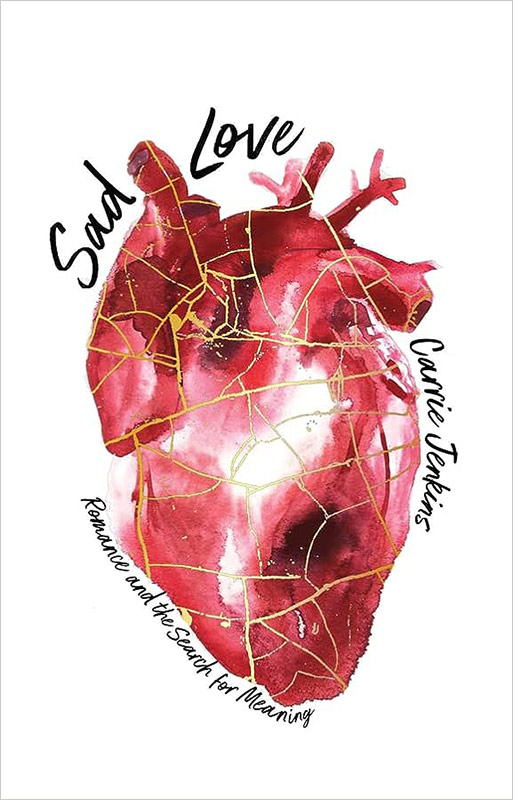
I’ve been swept away in love once in a particular way and those were very happy and exciting times. It ended up coming to an end in a crushing heartbreak. For as high as that high was, the low was equally low in a sense. That’s something that Carrie Jenkins hones in on here, the risks associated with it.
Many years ago, in the space of a year, I had back-to-back relationships with two out-and-out narcissists and I don’t use that term lightly. Check the boxes. At the start of both of these relationships, it was awesome. I never felt like I got the rug pulled under me. Not only did they pull the rug out from under me, they wrapped me up and kicked me. I’m very wary of all the hearts and flowers and all the fluttery feelings. I distrust that sensation now. I’ve gotten allergic not to romance but to the intensity of the beginning of a new relationship.
It’s the romantic mystique.
You need to be cautious, in part, because some of this is biological and evolutionary. It’s not that this was completely invented. The way I think about this stuff is how you differentiate the invented, fictional world from the intangible and factual world. I use the zombie apocalypse test case.
You are a romantic.
I am. When the zombie hordes come, what still matters? A bullet still hurts. Orgasms still feel good. You still need to breathe. You still need water. You still need sleep. Friendship still matters. Connection still matters, etc. but where you went to school and your 401(k) doesn’t matter anymore. Those things go away but love will still find a place within the zombie apocalypse. That is not a made-up thing. The way that it gets executed and the ceremonies associated with it, and all these kinds of things.
Also, which are deemed appropriate and deviant.
Suddenly, that gets stripped away because it’s not part of creating a certain type of society in a sense. Having a healthy sense of caution around this notion of romantic love which is that what goes up may come down and that it may blind you to the narcissistic tendencies of your partners perhaps.
It can leave you vulnerable to pretty severe manipulation.
Even this feeling that something doesn’t matter at that moment and that, as it starts to wear off, could then matter. Are any additional critiques of romantic love that you have or that Carrie put forth that are worth sharing? Let’s start to build an alternative. Amy, this seems to be your particular passion and in particular about building this alternative with the solo in mind.
One thing I like about eudemonic or eLove is that it is not only about sexual or romantic relationships. It’s not only about relationships with people. It can be about commitments and the close love that you feel sometimes for a community. It can be about a project of your own. As I was saying, books are a labor of love and labor is not always a fun thing. That could be part of it or the love that somebody might have for trying to make progress in your life bit by bit to build a better future for themselves or however that works.
There’s a lot to be said for that and for people who are solo by nature, whether or not they are in any sexually or romantically intimate relationships at all. It applies to friendships. As I read this, it’s like, “This is how I do my friendships and my family of choice.” Also, it can apply to very difficult relationships. Right now, I’m going through some family of origins stuff.
With all that aside, I love my family members that I’m having difficulty with and I’m very grateful to them. I want the best for them and that doesn’t mean I don’t want to strangle them sometimes. This book nailed that complex mix of emotions and it also hits on the importance of taking responsibility for your own emotions just like, “Happiness isn’t free and that this stuff is supposed to come to you.” That absolves people of emotional responsibility.
What I like about this book is that you’re going to get hit by stuff. You’re going to get hit by emotions. People that you care about are going to be going through stuff and it’s still up to you to handle yourself as best you can and to ask for the support you need. I like that about this book. It undermines the rugged individualism that permeates our culture. It gets to the point that everything we do and experience and all the relationships that we have come out of nowhere. There is nothing that’s truly original. It all builds on what came before and what other people are doing.
We are all influencing each other all the time and all the major factors of our lives, our cultures, our planet, and possibly, our universe are influencing each other all the time. We are not necessarily these discrete individual beings that we think we are and this book gets that bigger meta-premise and says, “You’re not in it alone but you do have to take caution, consideration, and care for how you treat others.
I’ll tell you something that I feel like I haven’t nailed yet, and it’s this. A common critique of solo or any singlehood advocacy is, “You’re too individualistic and selfish. You’re too alone.” What ends up happening is you have to say, “Solo, but not alone. Solo, but connected.”
You have to keep justifying and not all these qualifies.
You’ll be like, “Single people have more friends,” and there’s a lot of this where you’re having to tag this stuff to make it okay, and yet, someone on the escalator never has to go. I know it’s me and her, and we’re super isolated, but we have a lot of other friends and stuff. It’s like, “Alone is bad but alone plus one is okay.” That’s great. That’s all you need.
It’s ideal, even.
Nonetheless and even within those dyads, the best of them, the healthiest of them, and the most interdependent of them, there is a paradox which is that you are alone in a sense. You are singular. There’s no escaping that you and only you have full access to your experience, your thoughts, your feelings, and your perceptions. Also, this notion of you come in alone, you go out alone. There are some exceptions to that in general, while at the same time, most of us are connected. The lucky ones are, at least.
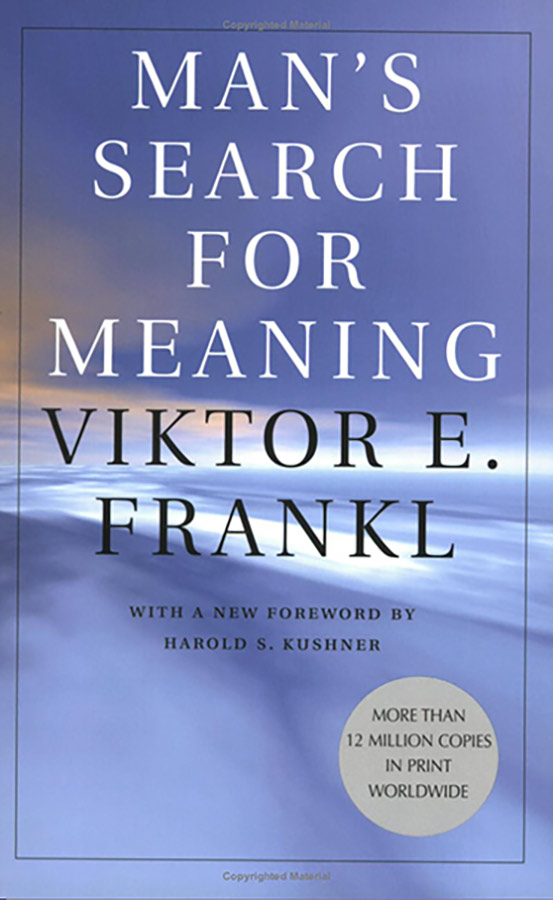
Also, sometimes the ones who are partnered up on that escalator are extremely isolated.
There’s this paradox of being human where you are like, “When it comes down to it, I’m on my own.” I’m not saying this in a bad way. I’m not saying this in a good way. It is a fact of who we are and at the same time, we are in the company of others.
Otherwise, in the society of others or the environment of others. Even if we don’t have enmeshment with other people on an interpersonal level, something Carrie Jenkins talks about a lot is the whole context of our lives is shaped by how social we are. Even if you are a hermit in a cave, how you feel about that cave, how you are judged for being in that cave, and all these things are still existing, even though there may not be any people in that cave with you. That’s it and that’s where part of eudaimonic love the part that is the daimons of the word. They’re forces of any size and shape that are acting upon you and by extension, your relationships. The origin of the word came from spirits acting.
They are not necessarily as beings. They could be the zeitgeist of a time.
That’s an important one. You think of the success of relationships does depend on not only the skills, talents, and compatibility of the people in it but also the legal structure, the time and place where you are, and the zeitgeist as you mentioned.
Also, your own mental and emotional health.
One of the things I think about is that even when you’re alone, you have people in your life. That hermit is reading Viktor Frankl, who’s no longer with us but lives on in the pages of his book.
I can’t say enough good things about Man’s Search for Meaning. Everybody should read that book. It’s an easy read and it’s worth it.
It’s not hyperbolic to say it’s one of the most important books ever written.
I love that concept too because it’s not as if every doorknob is imbued with a personality. Although some are. Some are cool. However, it is recognizing the capacity of how people, things, times, and environments can influence each other in a way that’s very similar to how people can influence each other. It’s recognizing the ecosystem of influence that turns us all into who we are and changes us from moment to moment. Also, it puts love into that context that is contextual and so it can’t be static because our context, our environments, and our states are not static. To say, “Happily ever after, I met the love of my life. We’re good now and we’ll always be good,” doesn’t make any sense. All of these things are dynamic.
Making romantic love is an essential goal of life, of the American dream. It’s unfair to the aromantics of the world who lack the capacity for that particular form of love. It’s unfair to the people who are victims of sexual and physical abuse, and who have trouble trusting of the next partner. It’s unfair to the person who has other important endeavors to pursue in their life.
It’s unfair to elders who are often assumed that there’s something wrong if they are still interested in sex or romance or who themselves devalue other sorts of love, and they write themselves off so easily.
It’s unfair to the people who have access to it and feel like they’re failing because they’re not living up to what it appears to be in the love songs, the movies, and the romance novels.
The romance itself is not the problem. It’s the pedestal it’s on.
eLove is complex. eLove is challenging, but it is ubiquitous. You have the ability to have eLoving moments with persons, places, and things in a sense, or even strangers. I’ll give you an example of this. There’s a sports recovery center here in town and I go to it often because I do a lot of sports that I need to recover from, but it also is a way to force me to relax in a way that I can’t. I sit in a sauna or I do these cold plunges.
There is a great Oliver Burkeman book I should recommend to you.
I’m doing all the things and they have these training tables. I put these compression, my friend, Rachel calls them, these squeezy leg bags, but they’re designed to stimulate some blood flow. However, one of the nice things about them is once you’re in it, you’re in it. There’s no getting around. It locks me into place. I’ll do some stim on my low back which can be a bit of a bugaboo.
This woman sits down next to me and she’s getting stim on her ankle. She had sprained her ankle. It was swollen up and so on. I’ve had sprained ankles. They’re very painful. They take a long time to heal and so on. We start chatting and having a friendly conversation. It ends up that she’s a fitness instructor at a gym chain that I go to on occasion.
I said to her, “That must be hard because you can’t work right now.” She starts crying. I’m in my squeezy leg bags and I lean over. I put my hand on her shoulder. She said, “I’m sorry.” I was like, “You have nothing to apologize about. It’s unfortunate that you’re dealing with this. I hope that you heal quickly.” I’ve never seen her again. I don’t know her name but we had this loving moment and she thanked me when I was leaving. It was wonderful and it was important to both of us.
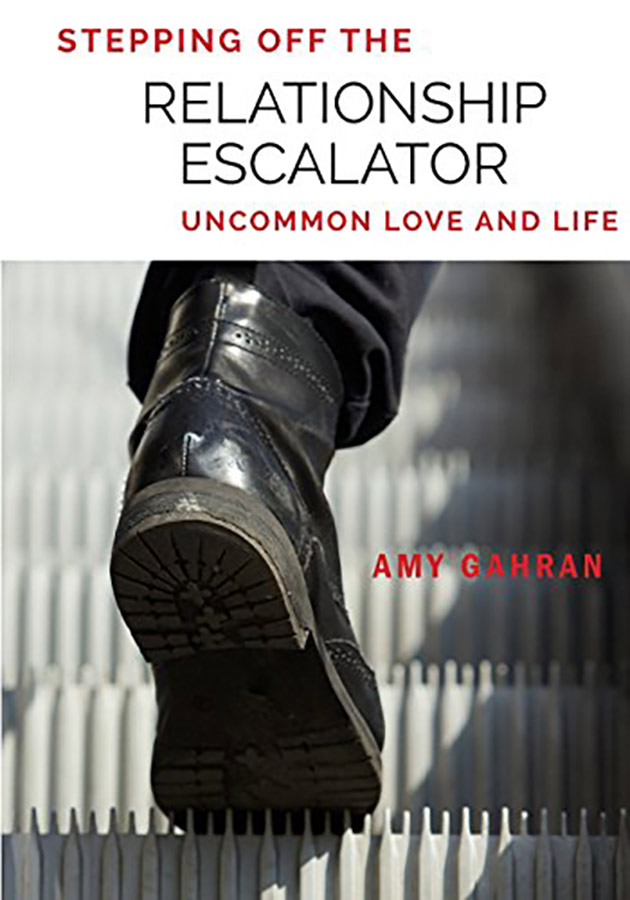
Part of eudaimonic or eLove is leaning into discomfort and it’s not always your own discomfort. I would draw another corollary. With the three of us in this room, I would say we’re friends. We’ve been together for a while. I don’t know either of you as well as I know a lot of my other friends but we come together to do something that’s meaningful to us. We all have a very similar desire to start. It’s much like Carrie Jenkins breaking down all of these social constructs and inviting people to unlearn these things that are harmful and othering. We come together and we do that. It feels good and important.
With the daimon of the microphones.
I wanted to put that out there. It’s like, “Here’s another example. It’s not a romantic situation but Carrie Jenkins says the reason she focuses on romance is because it’s so problematic but her concepts apply to any kind of love like Amy was saying. It does feel more congruent. It feels like it has a sense of gravitas. Reading some of these books has not been the happiest moment of my life, but coming together to exchange thoughts about them and share that with people seems meaningful.
It’s important.
I’ll make a case for a book that she references. Barbara Fredrickson is a social psychologist at UNC Chapel Hill. She wrote a book called Love 2.0. Barb got into studying love via a theory that she has about positive emotion, or more generally, called the broaden-and-build model. The idea is that negative things tend to narrow our perspective, and positive things tend to open our perspective, and that they build resiliency.
They’re useful for us in terms of our immune system in terms and of our resilience and so on. As I said, on balance, a life with more positive emotions than negative emotions is a good life. It doesn’t mean that you should have no negative emotions in your life. That is certainly not the case because there are times when you want to know your emotions.
Negative emotions tell you there’s a problem to be solved, for example. However, in her follow-up book, Love 2.0, she does a lot of myths busting around things like romantic love and so on. What she says and shows is that most love is much more ephemeral than we expect it to be. We expect it to be long lasting but these loving moments can sometimes be very brief. They can happen in a moment at a sports recovery place.
They can happen with strangers, but they can also happen with our family, our friends, our co-workers, our lovers, and with our romantic partners, and so on. Just because you’re not having loving moments with them doesn’t mean you don’t love them. Amy, you’ve articulated that very nicely with your siblings. You love your siblings even though you’re not always having loving moments with them.
You’ve reminded me that this is a book where you want to read the footnotes. First of all, they’re cool. There’s some great stuff in the footnotes. I must have downloaded Kindle sample chapters for ten books based on the footnotes.
I have a big list of articles and books. I wrote down two more in the course of this session.
Let’s turn our attention to prescription and to the degree that you’re comfortable advising someone who’s reading who doesn’t want to read this book who feels like, “I got it. I understand it,” who is interested in getting away from the hedonic treadmill and from this idea of pursuing happiness, finding it, adapting to it, looking for more, and so on, and wanting more eLove in their life. They want to take the advice of Frankl. They want it to ensue rather than pursue and fail. Where would you start for that person?
First things first, reach out to help whether it’s helping other people, an organization, or yourself. Getting out of your own head enough to make a positive impact often points people toward the second part of my prescription, which is to consider the meaning and appreciate it when you see it. Allow it to change. Sometimes, what’s meaningful to you at one point in your life or at one point in a relationship or career might change over time. I know for myself the times that I have found the most meaning in my life is when I’ve heeded my own inner call to be helpful and it’s not that I’m always good at being helpful.
I disagree.
That reflects very much on your own self-awareness, Amy, which is another piece of it. Take the time to take a breather and reflect back on, “What has brought me meaning? Where have I been in a state of flow and how can I seek out other people who find that same meaning?” You can either help them create it or have them help you create it. It’s all about collaboration. She says love is a collaborative work of art rather than a thing you find and put on the shelf.
For the zombie apocalypse, double tap.
Work on your cardio.
That’s on Zombieland, which is why I think one of the best zombie movies because it’s comedy. I second what you folks say. I talked about these three paths to flourishing. One is a positive emotion. That is a fine path for people as long as it’s executed well. The other one is the purpose, which has two subsets. It’s what we’ve been talking about, which is doing something bigger than yourself for others. The other one is achievement. It’s doing something bigger than yourself for yourself.
Raising children might be meaningful. Caring for cancer might be meaningful. Writing a book that helps people have new perspectives on relationships may be meaningful. An achievement might be running a marathon or building a business or getting an advanced degree. The last path is engagement. It’s pursuing creative, flow-worthy pursuits, solving problems, and making things. In Laura’s world, it’s creating killer spreadsheets.
It’s breathtaking even.
These flow-worthy experiences of putting together these incredible spreadsheets. I’m saying that tongue-in-cheek, but I believe that.
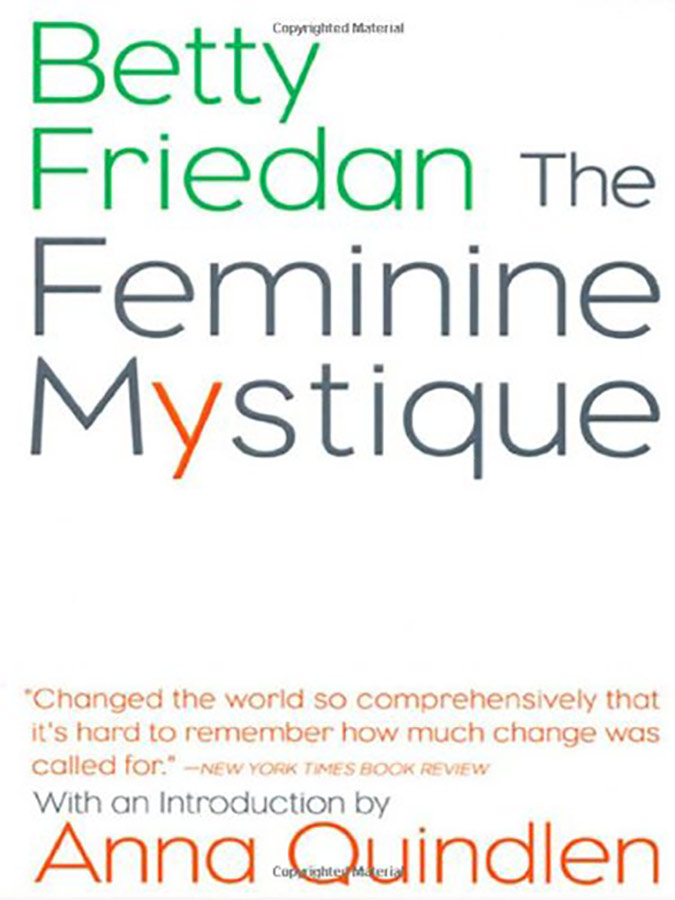
I get in a state of flow when I’m doing that, for sure.
My advice is to look for the things that you find yourself complaining about that you keep doing over and over again. You’re like, “Why am I doing this project? Why am I running another marathon?” It’s where you have put yourself in an uncomfortable situation that you chose and you chose it because you wanted to do it. You didn’t choose it because you wanted to impress someone else.
You felt compelled to do this thing and you’re in it and it’s painful. It’s creating friction and then you run it. You’re like, “That’s the last one,” and then a day later, you’re looking at the calendar, “When is the next? I need enough time.” That’s yourself telling you that there’s something important for you to be doing. I can’t tell people what exactly that thing is but sometimes the hint is already there.
Meaning can change, and sometimes when meaning arises or changes, that’s an emergent property. You don’t always see it coming in advance. You don’t always say, “I recognize that I want this goal and it’s going to be this meaning.” Life is not like that. You have to be open to the serendipity of it and go with it when it happens.
The other thing I’ll add and speaking of philosophers, Friedrich Nietzsche is one of my favorites in part because he has this wonderful essay about friendships and about how important friendships are for flourishing. The idea is that friends are close enough to know and they care about you enough to be honest. They have perspective because they have the optimal distance and they’re going to tell you what you need to hear in order to do this.
I will often ask my closest friends, “What should I be doing here? How should I be approaching this? How should I be thinking?” They know me. They see me. They care about me and they’re not afraid to tell me something that I don’t want to hear, which often, I always say, “Dang it. You’re right.” By the way, the act of asking a friend is an act that brings you closer together. That’s a loving moment that you have. We call it tough love for a reason.
You’re inviting them to collaborate with you on your journey.
They’re like an advisor who in some ways has skin in the game because when you grow and when you flourish, your friendship also benefits from that. You become a better person and you can become a better friend. The last thought I want to ask bringing this back to the solo thing. It’s pretty clear that this book is an attack on the S community.
I wouldn’t call it an attack. I would say she’s going in there with a wrench and loosening the bolts.
What metaphor would you use, Laura?
She’s taking it off its pedestal.
Also, she’s elevating this other form of love, the sad love as she calls it. I also quibble with the name.
It’s catchy.
When it comes to developing eLove, this flourishing form of love for our solos, some want to ride the escalator and some are open to it. Some are open to an unconventional relationship and others are disinterested in romance or sex at this time, or indefinitely in their life. What advice would you give them to be able to better cultivate these kinds of connections with others?
I keep personally coming back to whatever people you already know, just try to go a little bit deeper. It’s hard to get the concepts in this book from scratch with people you don’t know at all. It might be a little less intimidating. Be aware that not all the people in your life are as interested in well-being and flourishing as you might be. Have a little judgment about that.
That’s okay. Relationships can end. Carrie Jenkins is giving us that permission as well and I would say the power of reframing things. We unlearn a lot on this show and often, doing things differently is framed as different, risky, and bad. We’re welcoming a reframe of that into, “It’s not different, risky, or bad. It’s creative. It’s life-affirming. It’s authentic. It’s empowering.” Even going through the same act with that different framing is very helpful instead of, “I’m deviating from the norm.” It’s, “I’m creating.”
The author made the case quite a bit in this book. She’s not a rebel and people kept saying, “Your relationship style is rebellious. She’s like, “No. I’m a rule follower.” To your point, even without reading this book, knowing that it doesn’t have to be this big scary thing that is trying to revolutionize everything, you can take it in smaller bites.
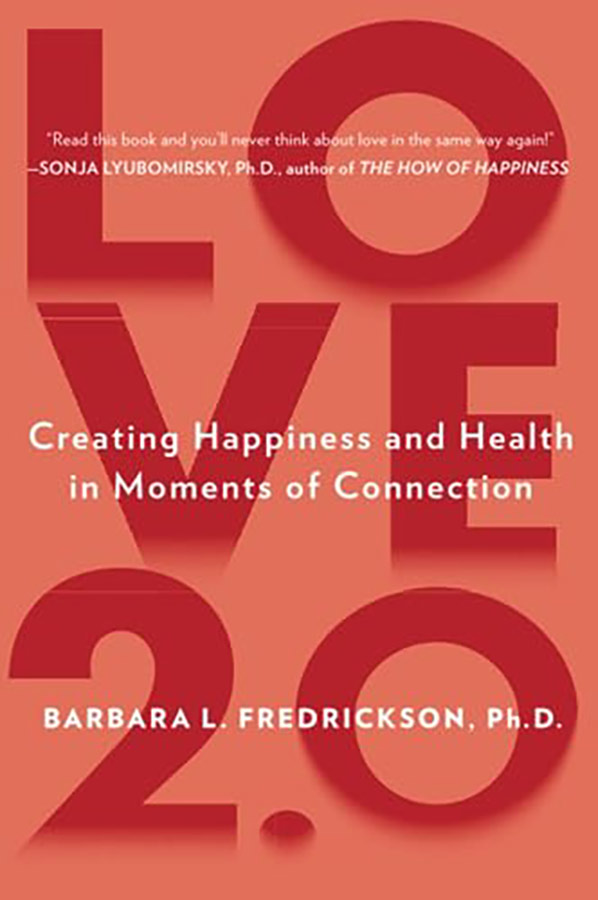
I’ll add a quick one. I don’t reserve the word love for romantic love. I use it liberally with people. I tell them I love them. I say, “I have love in my heart for you.” I feel like reusing that word for a broader context of love is useful and it’s often very welcomed. Other people find it perplexing. I give it freely. I don’t expect it in return. It’s not threatening. If I say, “I love you,” and someone doesn’t respond in kind, which by the way, is a terrifying endeavor in romantic love. However, in eLove, you can give it. It can be one way. It’s fine and not everybody is able to give it back because they were raised in a culture that holds that word for a very small set of people.
Otherwise, they have other bad connotations with it where it’s deployed as a trap.
Carrie Jenkins, thank you for writing this book. If you’re reading this, you rocked it. We love you.
We need not crap-talk you as much as we did.
Did you give her a chance to turn you down?
I didn’t even bother. Thanks to both of you.
Thank you.
Cheers.
Important Links
- Amy Gahran – LinkedIn
- Four Thousand Weeks
- Minimizing Marriage
- Sad Love
- Man’s Search for Meaning
- The Feminine Mystique
- Relationship Design – past episode
- Friends with Benefits – past episode
- Love 2.0
- https://petermcgraw.org/solo-book-club-minimizing-marriage
- https://www.Amazon.com/dp/1635768861?psc=1&smid=ATVPDKIKX0DER&ref_=chk_typ_imgToDp
About Amy Gahran

About Laura Grant

